Damning report exposes ‘unacceptable’ Triple-0 delays
Daniel Andrews has been labelled a “coward” for leaving his deputy premier to answer questions over a damning report into the state’s emergency call system.
Victoria
Don't miss out on the headlines from Victoria. Followed categories will be added to My News.
Premier Daniel Andrews has failed to front the media for a second day in a row following the release of a damning review into the state’s Emergency Services Telecommunications Authority (ESTA), leaving his deputy Jacinta Allan to answer questions surrounding “unacceptable” triple-0 delays.
The Deputy Premier on Monday defended the government’s decision to release its response to the report over the weekend, insisting it was made public as soon as possible.
“The report and the government’s response was finalised on late Friday, on Friday afternoon, and as soon as that process was completed, it was made available,” Minister Allan said.
“It is normal practice for government to receive the report, take an appropriate amount of time to consider the detail of the report and have its recommendations ready and released in conjunction with the release of the report.
“And I think this is particularly true for matters that are of complex, really important public policy issues, to have a report released and have the community see how the government is responding to that report.
“ I think that’s an appropriate way to handle reports of this nature.”
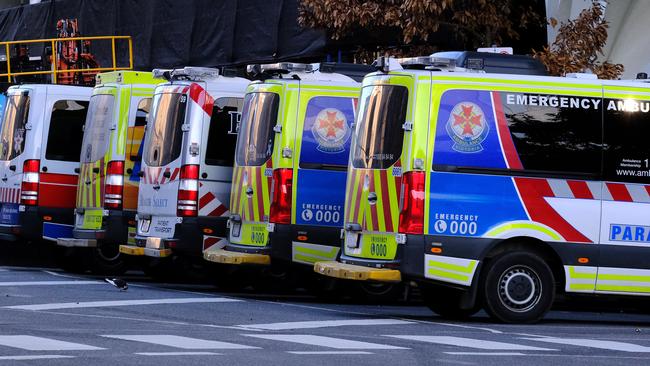
Ms Allan also defended the Premier for not being available to comment on the report’s finding over the past two days.,
“I’m confident the Premier will be back with the media and talking on public policy matters, on all areas of government, sometime soon,” Ms Allan said.
“The pandemic response, investment in our healthcare system more broadly — the Premier has addressed these matters constantly and consistently. For the better part of the last three years, the Premier has made multiple daily press conference ... on all of these matters.
“So it’s not like he’s never not commented before on these matters, and I’m sure he will be back with the media and back talking about these matters and many other areas of work that’s going on across government very soon.”
When asked if the government accepted full responsibility for the 33 deaths associated with the triple-zero and ambulance delays, Ms Allan pointed to Emergency Services Minister Jaclyn Symes’ apology to those affected on the weekend.
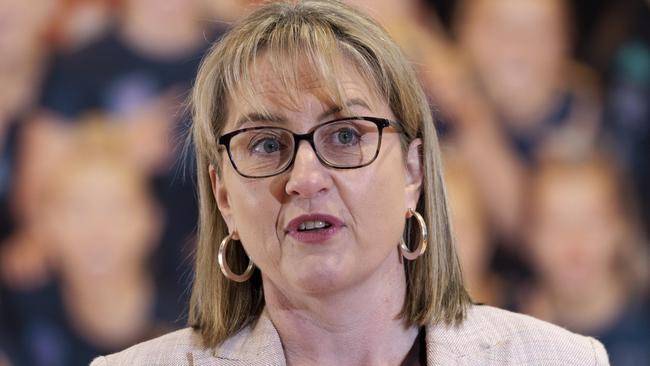
“The Emergency Service Minister did, on behalf of the government, provide an apology to the families of people who have lost loved ones,” Ms Allan said.
“In terms of the ultimate cause of death, that is a matter for the coroner to determine, and it’s appropriate that we let the coroner undertake that independent work.”
Opposition Leader Matthew Guy criticised Ms Allan for dodging questions surrounding the report.
“For the deputy premier to try and bat this away as a PR issue for her and to say that those matters aren’t for her to answer, well, what is she there for?
“What is the state government there for if they can’t provide excuses or answers or rationale or reasons ... as to why their health system failed?,” Mr Guy said.
“Nothing should be more important for the government (and) for the Premier today than to take responsibility for failings in our health service where 33 people died.”
Opposition health spokeswoman Georgie Crozier has branded Mr Andrews “a coward” for failing to front the media following the report’s release.
“For the Premier not to front up over the last three days over this very significant report where 33 Victorians lost their lives, demonstrates the extent the government will go through to try to bury this appalling record,” Ms Crozier said.
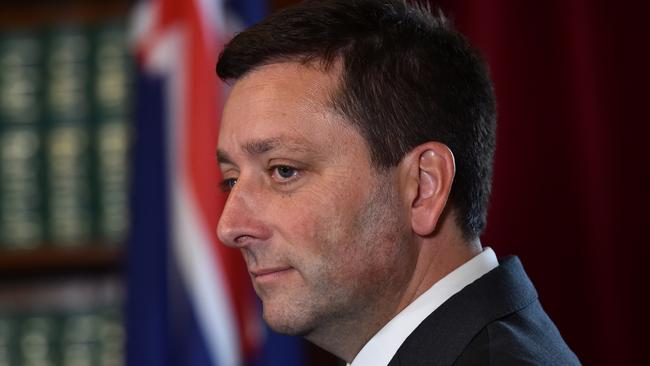
Review details ‘unacceptable’ delays
Thirty-three Victorians died after triple-zero and ambulance delays – and the state government was slammed for not fixing major funding shortfalls.
An independent review by the emergency services watchdog detailed “unacceptable” delays for emergency ambulance calls during Covid – including a record 76 minutes – and laid bare the failures in Victoria’s emergency call-taking system.
The Inspector-General for Emergency Management review (IGEM) said “longstanding” issues with the funding model – raised years earlier in a 2015 review – restricted the Emergency Services Telecommunications Authority (ESTA) ability to plan and left them unable to cope with the surge in demand.
“The Victorian government was aware of ESTA’s precarious financial position as early as 2015,” the report read.
“Since 2014-15, ESTA has sought, and government has provided, annual supplementary funding via the Victorian state budget for its structural deficit. The ad hoc nature of the year-to-year supplementary funding arrangements limits ESTA’s ability to recruit to meet demand.”
Emergency Services Minister Jaclyn Symes offered her “deepest sympathies to those who have lost their loved ones during the pandemic” and emphasised “major structural reforms” were already underway.
“The ESTA today is not the same as the ESTA six months ago,” she said.
“We are using the lessons from these reviews to prepare our system to be strong and resilient into the future.”
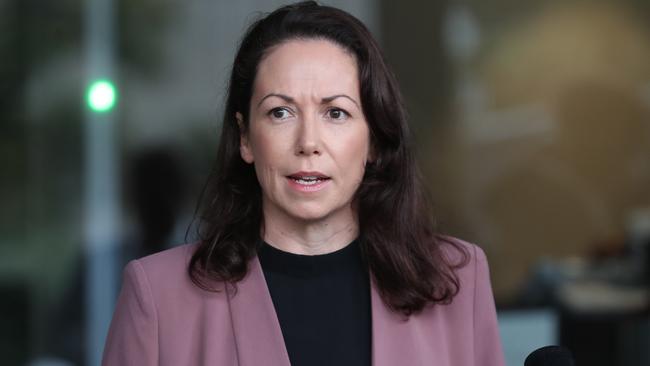
While a significant jump in the number of calls increased the agency’s workload during Covid, the IGEM review stated the rise in demand alone could not be blamed for the delays in answering calls.
The review identified 40 “potential adverse events” between December 1, 2020 and May 31, 2022 – including 11 in October 2021 alone – linked to long call waiting times or in three cases, ambulance resourcing or dispatch issues.
Thirty-three of these patients died, but the IGEM noted he could not determine whether an earlier response would have saved them and this was for the Coroner – who is investigating – to determine later.
The IGEM found “significant delays” began in December 2020 and that, from mid 2021, new Covid cases, an increase in sudden severe medical problems (linked to delays in check-ups during lockdowns) and the suspension of certain elective procedures increased demand even further.
The report zeroed in on October 2021 and January 2022 as months with significant delays.
ESTA took more than 38 minutes to answer one call on October 28 – the longest delay that month.
On that day, 80 per cent of emergency calls took more than 10 minutes to answer, with fewer than 19 per cent of calls answered in the required five seconds.
Despite the longest delays being recorded that day, the third lowest number of calls for that month was recorded on October 27.
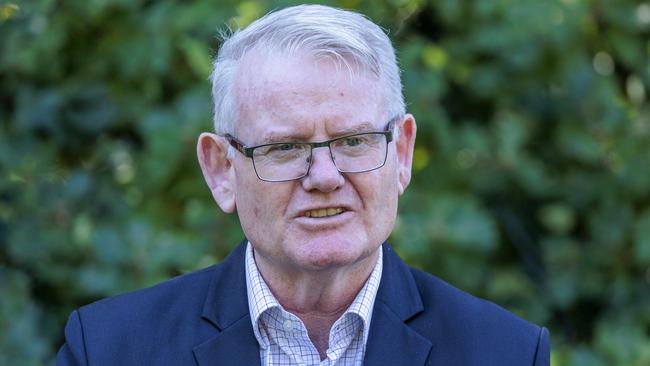
The IGEM found ESTA struggled with resourcing in October – with a drop in the number of hours worked compared to the previous month – and could not “field enough call-takers to meet the increased call activity”.
By January 2022, ESTA’s performance had dropped to its lowest in history, with 61 per cent of calls not answered within time (five seconds).
The longest delay was on January 14, when one caller waited more than an hour and 15 minutes for their call to be answered. A week later, January 22, marked the agency’s worst day in January, when fewer than 13 per cent of emergency ambulance calls were answered on time.
The report found pressures faced in January included a high number of Covid cases, warm weather and the associated increase in people travelling and drinking alcohol, public holidays such as New Year’s Day and Australia Day and a high number of furloughed staff due to Covid.
Other key findings in the report included:
• Technical issues resulted in some triple-0 callers losing their spots in the queue, meaning people were not answered on a “first come, first served” basis;
• Lessons from Victoria’s deadly thunderstorm asthma event — such as giving callers the estimated ambulance waiting times — had not been implemented before the pandemic;
• ESTA’S computer dispatch system was at risk of failing in the lead-up to the 2021-2021 fire season;
• Staff furlough, a significant number of non-emergency calls and a lack of initial community education on managing Covid at home also placed pressure on ESTA.
The 40 potentially adverse outcomes included:
• Cardiac arrests where ESTA took several minutes to answer
• An incident last summer when two people were attacked by a wild animal and a call from a member of the public took more than three minutes to be answered
• A breathing difficulties case where the first caller waited more than six minutes. When they called a second time – having waited twenty minutes and still received no ambulance due to shortages – their call was again delayed for several minutes.
Inspector-General Tony Pearce said no potentially adverse events had been identified since May this year
“To the families and friends of people who were involved, I apologise,” he said.
He said while he was not able to determine whether the delay caused the 33 deaths identified, but assured loved ones his office has passed on their work to the Coroner, who can make that finding.
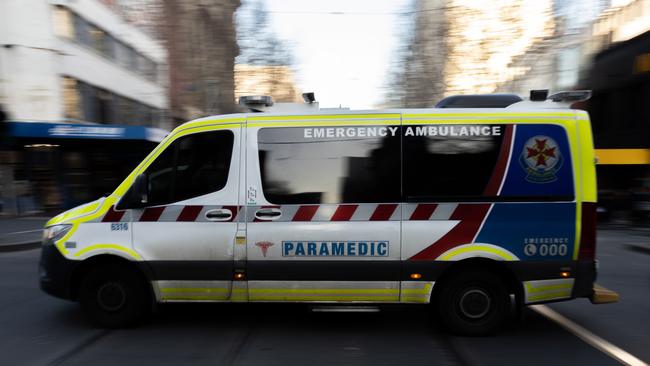
A second IGEM report on Victoria’s preparedness for major public health emergencies, also released on Saturday, identified other key issues from the pandemic in Victoria – such as contact tracing – and criticised the federal government’s response.
Stephen Leane, who was appointed ESTA’S interim chief executive in October 2021 amid highly publicised call-taking delays – said ESTA was clearly “in crisis” when he began.
Mr Leane said most agencies would struggle if they were faced with another surge like that experienced in January, but said ESTA was in a “much better position” to cope now.
“I walked in the 25th of October and there was no doubt that ESTA was in crisis,” he said.
“Staff were disenfranchised from management, senior management.”
Victorian Ambulance Union general secretary Danny Hill welcomed the recommended funding changes but said the union had been calling for a sustainable model for “several years before the pandemic”.
The Victorian government accepted all findings and recommendations in the report and pointed to changes that have already been introduced – including 400 extra staff and $333m in funding over five years – made since the reviews began.
‘No ambulance was on its way’
Home alone, phone in hand and her heart buzzing “like a wind-up toy”, Mel Anton last March feared she was about to join the list of Victorians who had died waiting on hold to talk to an ambulance operator.
Moments from collapsing, the Hughesdale mother of two unlocked her front door for paramedics who ultimately never arrived.
Ms Anton, now 44, was on hold for more than five minutes until an operator picked up the phone, only to be put on hold again.
Having lost relatives in their 40s to heart attacks, Ms Anton wasn’t sure what the sudden onset of dizziness and a racing heart was.
“It got to the point where I was having trouble breathing,” she told the Sunday Herald Sun following the release of a damning review into the state’s emergency call system.
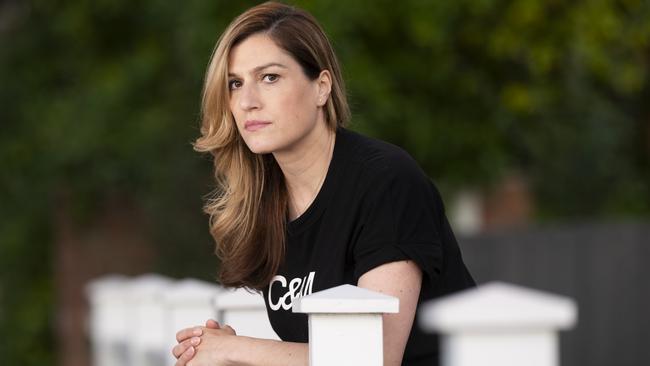
In total, 6449 calls to triple-0 were not answered within a minute between September 2021 and June 2022.
Ms Anton said she was just one of thousands of Victorians who have been let down by an overstretched ambulance service andthe Emergency Services Telecommunications Authority.
“I have never called an ambulance before, and I avoided making that call until the last moment,” she said.
“(Waiting on hold) I was talking to myself saying ‘this is going to be fine’.
“People should be able to feel that if they call an ambulance, they shouldn’t be left waiting,” she said.
Ms Anton said she was shocked how little people seem to care about the people not being able to get desperate medical attention.
“We’ve become desensitised to the fact — it’s almost to be expected,” she said.
Ms Anton said only Royal Commission could fix Victoria’s health and ambulance system.
“We need to have a really thorough and objective review … we deserve it,” she said.
“People, babies have died because of this.”
Ms Anton said she was fortunate that her heart scare was not worse.
“What shocks me the most is I could have had a heart attack and no ambulance was on its way even though I had called one,” she said.
“It never came.
“My family could have found me on the floor at the front door.”
Report ‘won’t bring dad back’
Dave Edwards waited months for a response from the state government after his father died on the front lawn, waiting for someone to answer his wife’s triple-0 call.
The first communication he received from Emergency Services Minister Jaclyn Symes’s office was on Saturday morning, to say the report into ESTA was about to be released.
“Well that’s really good, thank you very much,” Mr Edwards said.
“(Ms Symes) didn’t have the balls to ring me up, did she?
“She stood up in parliament and said in parliament she knows exactly what went on and I question that, because she never contacted anyone in our family.”
Paramedics arrived at Alfred Edwards’s home almost 40 minutes after his wife first tried to call triple-0.
He was pronounced dead at the scene.
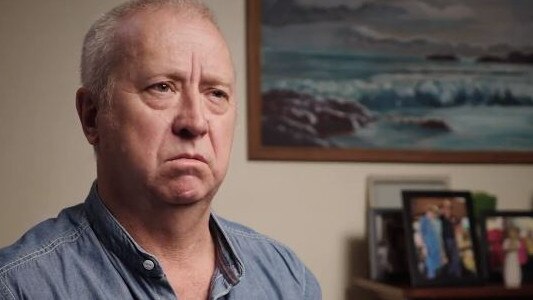
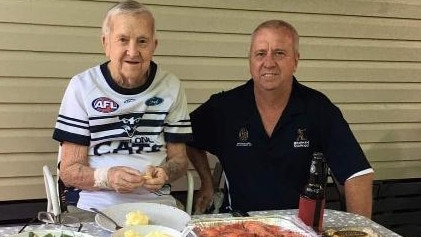
Mr Edwards said the report “means very little to me” because “it’s not going to bring my father back”.
“The fact that I stood there trying to get help, and I couldn’t get it, and my father died on the front lawn, there’s nothing they can do or say to make me feel better.
“There is not a word that can describe how angry I am … it’s disgusting at the very least.
“I’m furious, you’ve got no idea how I feel when I walk into my mum’s house and she’s weeping at the kitchen table.”
The Swan Hill local recounted the harrowing events of the day his father died, detailing just how badly the triple-0 systemwas operating.
“I had a call from mum to say dad had collapsed on the front lawn,” he said.
“Dad was unresponsive on the front lawn … I couldn’t feel a pulse or see any sign he was breathing.
“She (mum) was still trying to ring triple-0 when I got there and we couldn’t get through.
Edwards said he resorted to calling the local police to see if they could contact an ambulance.
“The policeman tried to ring the ambulance … he couldn’t get through either.
“It would have been 35 minutes before an ambulance arrived, from the time mum called to the time when the ambulance actually got there.
“They (paramedics) had no idea there was an emergency, they came around and dad had already passed.
“When you actually need help, and you can’t get it, you don’t know how empty the feeling is when they take dad away down tothe morgue.”
Edwards has appeared in a Liberal Party advertisement.
More Coverage
Originally published as Damning report exposes ‘unacceptable’ Triple-0 delays




